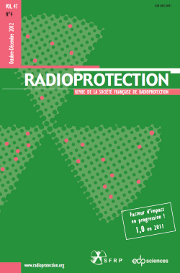Article contents
Biogeochemical behaviour of anionic radionuclides in soil: Evidence for biotic interactions
Published online by Cambridge University Press: 17 June 2005
Abstract
99Tc and 79Se, two long-lived radionuclides, are supposed to be highly mobile in soils, because of their anionic forms. Their behaviours in the soil are often considered only from a physico-chemical point of view, although the microorganisms can affect either directly or indirectly their speciation. This study demonstrates the role of the microbial compartment in the retention of Se and Tc in soil by comparing experiments with soils constrained to different microbiological status (sterile / raw / amended). Kd coefficients for Se and Tc were determined in batch experiments, whereas transport of Se and Tc was investigated through column leaching experiments. Kd for Se was enhanced for the raw soil without amendment compared to the value obtained for the sterilised soil. The retention of Se was higher again in the amended soil. Besides, a biofilm, which can directly retain Se, was obtained at the entrance of the amended soil column. This effect was less obvious for Tc in batch experiments, but was revealed by leaching experiments where a high quantity of Tc was retained in the amended soil columns. These results give strong evidence that microorganisms are responsible for a greater retention of Se and Tc in soil.
- Type
- Research Article
- Information
- Copyright
- © EDP Sciences, 2005
- 4
- Cited by




